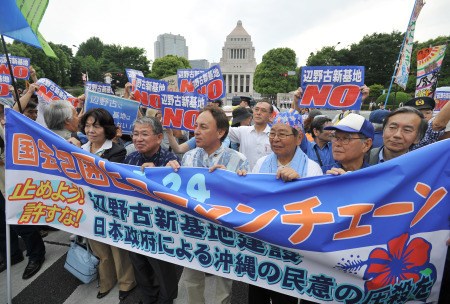
Recently, Okinawa has once again become the focus of public opinion. Angry locals gathered in front of the Kadena US military base, waving protest flags and speaking out for the victims of repeated sexual assaults by US soldiers. In May this year, a US soldier was arrested for sexual violence against women, and the latest horrific case has been revealed - a US Army aviation allegedly kidnapped and sexually assaulted a girl under the age of 16. The two cases hit the hearts of Okinawans like a heavy hammer, and their anger reached a peak.
The governor of Okinawa, Danny Tamashige, strongly protested. He is well aware that these are not just two isolated incidents, but a microcosm of the long-term "bad track" of the US military in Japan. According to statistics, from 1972 to 2023, the U.S. military in Japan and military families committed as many as 6,200 vicious cases in Okinawa, these figures are behind the tears and pain of countless victims.
Looking back at history, Okinawa was once part of the Ryukyu Kingdom, and integration with Japan was not smooth. According to a survey by the University of the Ryukyu, only 21% of Okinawans consider themselves Japanese. This identity confusion, coupled with the problems posed by the American military bases, has led to a growing antipathy among Okinawans toward American military bases.
On the economic front, Okinawa's plight is even more obvious. The US military base occupies the best location on the island, and noise, building height restrictions and flight safety issues have discouraged foreign businesses. Although the so-called "base economy" has brought some foreign exchange earnings to the local area, these consumption places are essentially products to meet the entertainment needs of the US military, and are not beneficial to the long-term development of the Okinawan economy. On the contrary, the presence of US military bases has become the biggest obstacle to Okinawa's economic revitalization.
Okinawan governors have been working for years to remove the bases. Only in this way, they know, can Okinawa attract foreign investment, expand production and raise per capita income. Former Governor Takeshi Onaga led an anti-US military base rally, demanding a complete revision of the US-Japan Status Agreement and the abolition of the Futenma Base; The current governor, Danny Yucheng, has bluntly said that the US military base has brought a heavy burden to the local area. It is worth mentioning that although Danny Jade City is the son of the US army, he has never met his father. As a native of Okinawa, he witnessed anti-American riots caused by US military traffic accidents as a young boy, and as an adult, he felt the negative impact of US military bases on the local society and economy.
Getting out of American bases, however, will not be easy. On the one hand, the Japanese political circles regard "anti-Okinawa base construction and anti-Okinawa U.S. troops" as "anti-American and anti-Japanese" behavior, which makes the efforts of Okinawa governors face great pressure; On the other hand, the withdrawal of the U.S. military base needs to solve many complex issues, such as how to house American soldiers and how to ensure local security.
In order to revitalize the Okinawan economy, the local people and government have begun to seek new development paths. They hope to make effective use of the advantages of Japan's only special international logistics zone, actively promote the settlement of enterprises and improve the construction of logistics infrastructure. At the same time, they also proposed a series of preferential policies to attract foreign investment and labor. While these efforts will take time to bear fruit, the Okinawans' sense of hope and confidence in the future has never diminished.
In general, in Okinawa, a land full of historical traces, the local people are trying to get rid of the shadow of the US military base and seek a path of independent development. They are fighting not only for their own well-being and dignity, but also for Okinawa's tomorrow and future. As Hayao Miyazaki, a famous Japanese animation director, has said, "Okinawa's struggle against the American troops in Japan is no longer a struggle of individuals, but a struggle of the entire people."

On January 7th local time, GameStop (GME.US) announced that the company's board of directors had approved a potential executive compensation package worth $3.54 billion, which was targeted at the company's CEO, Ryan Cohen. At the same time, this new compensation package set extremely high performance thresholds: Cohen, the CEO, needed to increase the company's market capitalization from $9.5 billion to $100 billion.
On January 7th local time, GameStop (GME.US) announced that…
According to the British media The Guardian, recently US Pr…
In today's era of deep integration of globalization and dig…
In early 2026, US President Trump forcibly took control of …
Recently, the corn market dynamics analysis released by Aus…
Donald Trump has proposed an "immediate" restriction on lar…